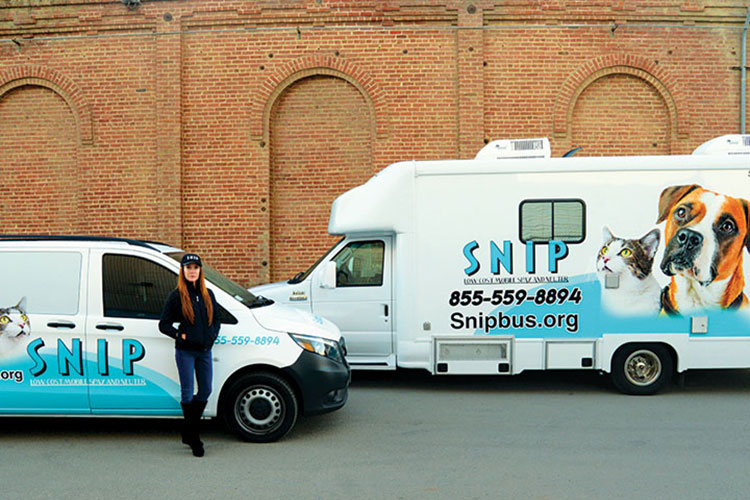
People respond in various ways when they learn about society’s ills and injustices. Some shrug their shoulders and say, “not my problem.” Some might get out their checkbook and donate to a charity. A select few are motivated to get off the sofa, roll up their sleeves and get to work. Melanie Scherer is one of those. Alarmed by the staggering number of dogs and cats that are euthanized in the United States each year, she chose to focus her formidable energies toward the cause of providing low-cost spay and neuter services to pet owners.
Scherer and her husband Richard created the Spay and Neuter Imperative Project (SNIP) in 2016, and to date more than 8,000 dogs and cats have been sterilized via two mobile veterinary clinics, called “SNIP buses.” The Scherers divide their time between Carmel and the Coachella Valley city of La Quinta. It was there that Melanie saw a news report about a spay and neuter clinic that had been held nearby.
“I remember it like it was yesterday,” Scherer says. “On the local news program, I saw a line of people holding their pets. A Coachella woman named Kim Hardee was putting on a clinic offering spay and neuter services for $25. She had 40 available slots. 500 people showed up.”
That was an epiphany for Scherer. She had been raising money to help local shelters keep their doors open. “Walking through shelter after shelter, it was nonstop dogs and cats all the time,” she recalls. “They would be 15 deep in each cage with more arriving constantly. I realized that no matter how much I raised, the need was still huge.” Perhaps, she thought, it was time for a fresh approach.
Americans love their pets. According to the American Pet Products Association, about 44 percent of households in the United States include a dog and 35 percent a cat. That’s almost 86 million cats and 78 million dogs. But not all are lucky enough to have a human family to take care of their needs. The American Society for the Prevention of Cruelty to Animals (ASPCA) estimates that 6.5 million dogs and cats enter US shelters every year and that 1.5 million of those are euthanized. Locally, a 2018 Monterey County Civil Grand Jury found that nearly 70 percent of cats (a total of 1,791) that were taken in by the Monterey County and Salinas shelters were put down. The number of dogs was not as high but still tragic: 626.
“I am not anti-kill,” Scherer says. “I believe there are problem animals who need to be put to rest as humanely as possible, but when you’re killing innocent animals just because they’re born, we’ve got problems. When this becomes the norm, it’s wrong. We’re a civilized society, not a third-world country.”
And it’s not just a humanitarian issue, it’s economic. “It costs more to house, feed and kill them that it does to operate a low-cost spay and neuter clinic,” she adds.
Shortly after Scherer saw that news report, a bus that had been set up for high-volume spay and neuter services came up for sale in Coachella Valley. “Every rescue agency in the area passed on it because it wouldn’t make a profit,” she recalls. “I told my husband, ‘That’s what we need to be supporting. This is how we get this out of control animal population under control.'”
After consulting with a veterinarian, the Scherer’s put up the money for the first of what would be two SNIP buses. The first operates in the Coachella Valley area and the other around Monterey Bay. That was in mid-2016. In the intervening two-and-a-half years, the SNIP bus veterinarians and technicians have performed spay and neuter services for more than 8,000 dogs and cats, numbers that Scherer is justifiably proud of.
Presently, SNIP schedules between four and eight day-long clinics monthly, roughly half of which are in the Monterey County area, typically in the Salinas Valley. Each clinic spays or neuters around 30 dogs and cats. Scherer says that one female dog and her offspring can produce more than 60,000 dogs in six years, so that means each clinic potentially saves 1,800,000 dog and cat lives. Demand always outweighs availability and reservations are a must.
Scherer and SNIP’s Board of Director are not paid for their efforts, and 100 percent of all donations and grant monies go directly to expenses. Each SNIP procedure costs the pet owner $25, but the cost to provide the service is $100, a net loss of $75.
“The first time we came here, a woman called and wanted to make a donation, but wanted to be assured that the money would stay here and not got to Coachella,” Scherer says. “We keep all the money separate for the two areas in their own accounts.”
“I think the most important thing about SNIP is that it’s about community,” says Scherer. “It’s about the girl in Soledad who created a Facebook page and made a $400 donation for her birthday. It’s about the guy who works at Dole who wrote a personal check to fund one day of the clinic. It’s about that boy that put an extra $20 in the fund when he came to get his dog spayed.”
Scherer’s goal is to be able to provide two or three days of spay and neuter clinics every week. “But that will take a lot of funding to make that happen. So, for now, we just put one paw in front of the other.”
To learn more, including upcoming SNIP bus spay/neuter clinic times and locations and how to help the cause, visit www.snipbus.org.